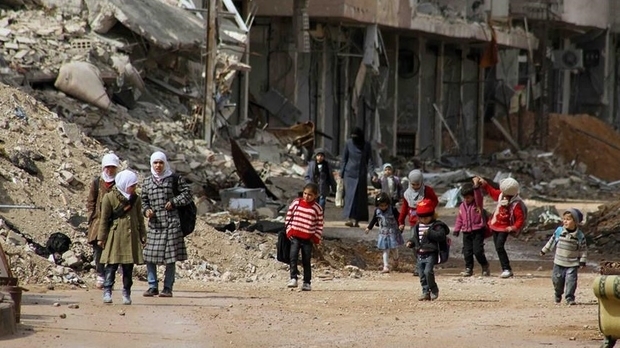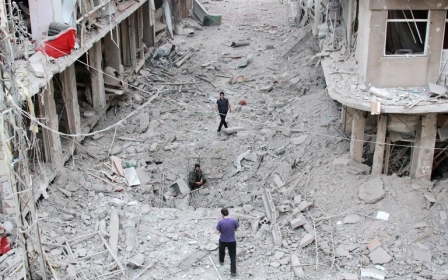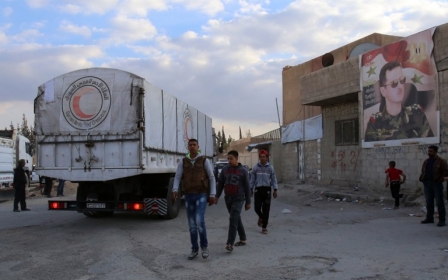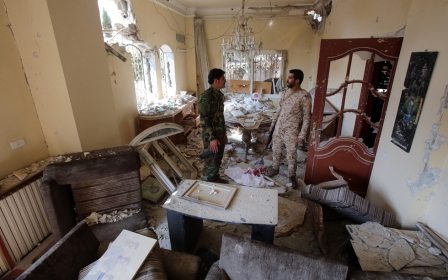Humanitarian aid drops over Syria are not 'imminent': UN

Aid airdrops to besieged areas in Syria are not expected to begin immediately, the United Nations said Thursday, despite urgent calls from France and the UK for deliveries to get started.
The UK and France led calls at the United Nations for humanitarian airdrops to Syria’s besieged areas, after aid agencies were only able to deliver medical aid to two of the country's 49 besieged areas on Wednesday.
On Thursday a senior UN official confirmed drops were not “imminent,” after Middle East Eye reported on Wednesday that is was unclear whether the Syrian governemnt would give its approval for air drops.
“As long as the World Food Programme has not yet finalised its plans, I don't think there's something imminent, but I think the process that will lead to airdrops has already started,” Ramzi Ezzedine Ramzi, deputy to UN envoy Staffan de Mistura, told reporters.
Humanitarian access in Syria has been a key sticking point in stalled UN-backed peace talks aimed at ending the five-year war that has killed at least 280,000 people and displaced millions.
Renewed calls for airdrops from London and Paris came despite supply deliveries on Wednesday to two towns besieged by government forces, where civilians are facing food shortages.
A local truce allowed a convoy to enter the town of Daraya near Damascus for the first time since late 2012, while another entered the nearby town of Moadamiyeh for the first time since March.
But the Syrian opposition said only medical supplies were in the Daraya delivery, while British charity Save the Children said it was “shocking and completely unacceptable” that it excluded desperately-needed food.
The UK has called for an emergency Security Council meeting Friday to discuss humanitarian access and to press ahead with air drops efforts.
“It's too little, too late,” said British envoy Matthew Rycroft, referring to Wednesday's land deliveries.
Speaking on Wednesday, UK Foreign Minister Philip Hammond said: “On the day of that deadline, the Assad regime has cynically allowed limited amounts of aid into Daraya and Mouadamiyeh, but it has failed to deliver the widespread humanitarian access called for by the international community. While air drops are complex, costly and risky, they are now the last resort to relieve human suffering across many besieged areas.“
French ambassador Francois Delattre, who holds the Security Council presidency this month, also blamed the Syrian regime for blocking access to towns and villages under siege.
”France is asking the United Nations and in particular the WFP to begin humanitarian air drops for all the areas in need, beginning with Daraya, Moadamiyeh and Madaya, where the civilian population including children risks dying of hunger,“ Delattre told a press conference.
Madaya became infamous in late 2015 after dozens starved in the town, which is besieged by pro-government forces.
According to the United Nations, a total of 592,000 people live under siege in Syria - the majority surrounded by government forces - and another four million live in hard-to-reach areas.
Staunch regime ally Russia on Wednesday said that the local truce in Daraya would be observed until Friday 00:01 am (2101 GMT) to allow for aid deliveries, as the US State Department spokesman John Kirby signalled the US was willing to support the World Food Programme in its plans to drop food aid.
But Russia's UN ambassador Vitaly Churkin suggested that plans to airdrop humanitarian relief could be put on hold. ”Airdrops are much more complicated and much less effective and so I think we need to continue to pursue land deliveries,“ Churkin said.
Meanwhile, the UN said on Thursday that helicopters could be used to deliver aid to besieged areas of Syria.
United Nations spokesman Stephane Dujarric said helicopters would have to be used to carry aid to 15 of 19 besieged areas that include densely populated towns.
"In urban areas, airdrops are not feasible, so you are talking about the use of helicopters," he said.
"One can imagine the security challenges for that - plus the security challenges of flying helicopters over the skies of Syria."
New MEE newsletter: Jerusalem Dispatch
Sign up to get the latest insights and analysis on Israel-Palestine, alongside Turkey Unpacked and other MEE newsletters
Middle East Eye delivers independent and unrivalled coverage and analysis of the Middle East, North Africa and beyond. To learn more about republishing this content and the associated fees, please fill out this form. More about MEE can be found here.




